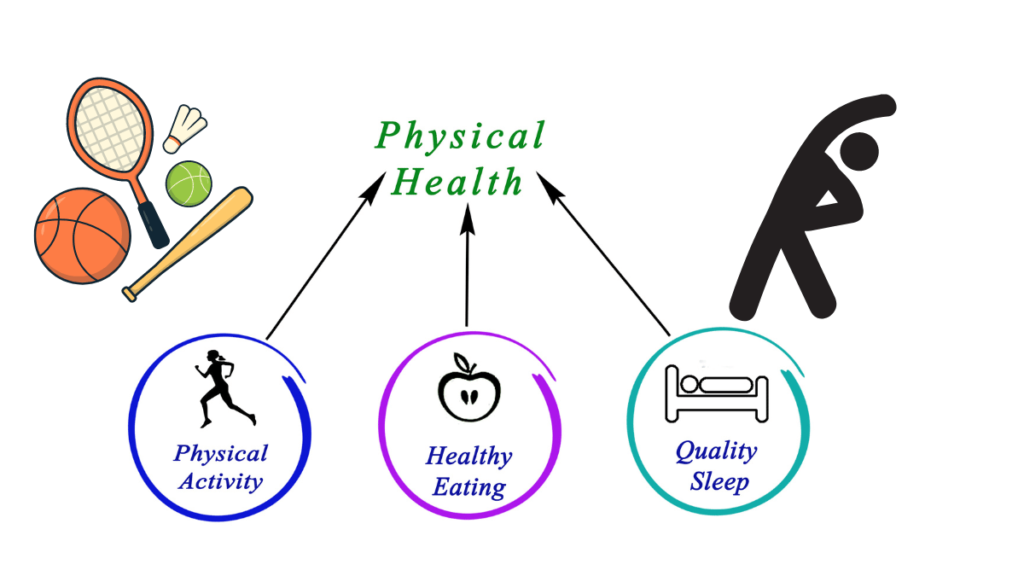Benefits of Maintaining Good Physical Health
Improved Mental Health
Maintaining good physical health has a profound effect on mental well-being. Regular exercise is crucial for mental health because it stimulates the release of endorphins, which are natural mood enhancers. These chemicals help to alleviate stress and reduce symptoms of anxiety and depression.
Beyond exercise, other aspects of physical health such as proper nutrition and adequate sleep also play a significant role in enhancing cognitive function and emotional stability. By supporting both physical and mental health, individuals can achieve a more balanced and positive emotional state.
Enhanced Longevity
Good physical health is a key factor in increasing life expectancy. Engaging in regular exercise and maintaining a nutritious diet can significantly lower the risk of chronic diseases such as heart disease, diabetes, and certain cancers. This proactive approach to health helps the body’s natural ability to repair and maintain itself, which in turn promotes a longer, healthier life. By focusing on physical well-being, individuals can enjoy extended longevity and a reduced likelihood of serious health issues.
Better Quality of Life
The quality of life benefits greatly from good physical health. When individuals maintain a healthy lifestyle, they experience improved mobility and reduced discomfort, making daily tasks easier and more enjoyable.
A strong, healthy body also fosters better social interactions and greater engagement in activities, contributing to an enriched and fulfilling life. By focusing on physical health, individuals often find that their daily experiences are more satisfying and rewarding.
Increased Energy Levels
One of the most noticeable benefits of good physical health is a significant boost in energy levels. Regular physical activity enhances cardiovascular efficiency and muscle strength, leading to sustained energy throughout the day.
Additionally, proper sleep hygiene ensures that individuals wake up feeling rested and revitalized. This increased energy translates into greater productivity and the ability to lead a more active and vibrant life.
Components of Physical Health
Regular Exercise
Regular exercise is a fundamental aspect of maintaining good physical health. Engaging in physical activity on a consistent basis helps to improve cardiovascular health, build muscle strength, and enhance overall physical fitness.
Exercise is not only vital for managing weight but also plays a significant role in boosting mental well-being. Activities such as walking, running, cycling, and swimming can help improve heart health, increase stamina, and promote a more active lifestyle.

A balanced exercise routine should include a variety of activities to ensure comprehensive fitness benefits.
Types of Exercise
To achieve well-rounded physical fitness, it’s important to incorporate different types of exercise into your routine:
- Cardiovascular Exercise: This includes activities like running, swimming, and cycling that elevate the heart rate and improve lung capacity. Cardiovascular exercises are crucial for enhancing aerobic fitness, burning calories, and supporting overall heart health.
- Strength Training: Exercises such as weightlifting, resistance band workouts, and body-weight exercises are essential for building muscle mass and strength. Strength training helps improve bone density, increase metabolic rate, and support joint health, making it a key component of a balanced fitness regimen.
- Flexibility Exercises: Stretching, yoga, and Pilates improve the flexibility and range of motion in your muscles and joints. These exercises are important for maintaining mobility, reducing the risk of injuries, and improving overall body balance.
- Balance Exercises: Activities like tai chi and specific balance drills enhance stability and coordination. Improving balance is particularly beneficial for preventing falls and maintaining core strength, which is important for overall physical stability.
Creating an Effective Workout Routine
Designing an effective workout routine involves setting clear fitness goals and incorporating a diverse mix of exercises. A well-structured routine should include cardiovascular, strength, flexibility, and balance training.
It’s important to gradually increase the intensity of workouts to prevent injuries and ensure continued progress. Consistency is key, so finding activities you enjoy and making exercise a regular part of your routine can lead to long-term health benefits.
Balanced Nutrition
Balanced nutrition is integral to supporting physical health and overall well-being. Eating a varied diet ensures that your body receives the essential nutrients it needs to function optimally. A balanced diet supports energy levels, aids in muscle recovery, and promotes overall health.
Essential Nutrients and Their Benefits
- Proteins: Essential for muscle repair and growth, proteins should be a key part of your diet. Good sources include lean meats, legumes, dairy products, and nuts. Proteins help in building and repairing tissues and are crucial for maintaining muscle mass.
- Carbohydrates: Carbohydrates provide the body with energy necessary for daily activities and exercise. Include whole grains, fruits, and vegetables in your diet to ensure you get complex carbohydrates that offer sustained energy and essential nutrients.
- Fats: Healthy fats are important for cell function and overall health. Opt for sources of unsaturated fats such as avocados, nuts, seeds, and olive oil. Healthy fats support brain function, hormone production, and energy levels.
- Vitamins and Minerals: These are vital for various bodily functions, including immune support and bone health. A diet rich in fruits, vegetables, and whole foods ensures you get a broad spectrum of essential vitamins and minerals.

Healthy Eating Habits
Adopting healthy eating habits is crucial for maintaining balanced nutrition. Focus on portion control, choose whole foods over processed options, and stick to regular meal times. Eating a variety of nutrient-dense foods helps to support energy levels and overall health, making it easier to achieve and maintain a healthy weight.
Hydration and Its Importance
Proper hydration is essential for maintaining fluid balance and supporting numerous bodily functions. Drinking adequate water helps regulate body temperature, supports digestion, and keeps joints lubricated. Aim to drink water consistently throughout the day and adjust your intake based on your activity level and environmental conditions to ensure optimal hydration.
Adequate Rest and Recovery
Importance of Sleep
Adequate rest and recovery, particularly through quality sleep, are crucial for physical health. Sleep allows the body to repair and regenerate tissues, consolidate memories, and restore energy levels. A lack of proper sleep can lead to various health issues, including weakened immune function, increased stress, and impaired cognitive performance.
Strategies for Better Sleep
Improving sleep quality involves establishing a consistent sleep schedule, creating a relaxing bedtime routine, and ensuring a comfortable sleep environment. Limiting exposure to screens before bed, managing stress effectively, and avoiding stimulants like caffeine in the evening can also contribute to better sleep quality.
Managing Stress
Effective stress management is vital for maintaining overall physical health. Chronic stress can negatively impact the body, leading to issues such as weakened immune function and increased risk of chronic diseases.
Incorporating stress-relief practices such as meditation, deep breathing exercises, and regular physical activity can help manage stress levels and improve overall well-being.
Developing healthy lifestyle habits is a multifaceted process that involves setting realistic goals, building a supportive environment, and continuously adapting and improving. Here’s a comprehensive guide to help you create and maintain these habits:
Developing Healthy Lifestyle Habits
Setting Realistic Goals
The foundation of a successful healthy lifestyle starts with setting realistic goals. Begin by identifying what you want to achieve—whether it’s improving fitness, adopting a healthier diet, or reducing stress. Break these goals down into manageable steps and set specific, measurable, achievable, relevant, and time-bound (SMART) objectives.
This approach helps in maintaining focus and tracking progress. For instance, instead of aiming to “get fit,” set a goal like “exercise for 30 minutes, five times a week.”
Building a Support System
Creating and nurturing a support system can significantly enhance your journey toward a healthier lifestyle. Surround yourself with people who encourage and motivate you.
This could be friends, family, or even joining a fitness group or online community. A supportive environment can offer accountability, share knowledge, and provide emotional support, making it easier to stay committed to your goals.
Overcoming Common Barriers
Identifying and overcoming common barriers is essential for long-term success. Barriers might include a lack of time, motivation, or access to resources.
To address these, consider practical solutions such as scheduling workouts into your calendar, finding quick and healthy meal options, or utilizing home exercise routines if gym access is limited. Developing problem-solving skills and staying adaptable can help you navigate and overcome these challenges.
Monitoring and Assessing Your Physical Health
Regular monitoring and assessing of your physical health is crucial for ensuring you’re on track with your goals and making necessary adjustments. This involves keeping track of various health metrics like weight, fitness levels, dietary habits, and overall well-being.
Self-Assessment Techniques
Utilize self-assessment techniques to evaluate your progress and make informed decisions. This can include tracking your physical activity, keeping a food journal, or using fitness apps that monitor your progress. Regular self-assessment helps in recognizing achievements, identifying areas for improvement, and staying motivated.
When to Seek Professional Help
It’s important to know when to seek professional help. If you encounter persistent health issues, experience significant changes in your physical or mental health, or need personalized advice, consult with healthcare professionals such as doctors, dietitians, or fitness experts. They can provide tailored guidance, address specific concerns, and help you achieve your health goals safely.
Utilizing Technology and Tools
Incorporating technology and tools can greatly support your journey toward a healthier lifestyle. Fitness apps, wearable devices, and online resources can provide valuable insights into your health metrics, offer personalized workout and nutrition plans, and help you stay connected with your goals. Tools like pedometers, heart rate monitors, and meal-planning apps can enhance your ability to track progress and make informed decisions.
Tips for Maintaining Long-Term Physical Health

Maintaining long-term physical health requires ongoing effort and commitment. Here are some tips to help you sustain healthy habits:
- Stay Consistent: Consistency is key in achieving and maintaining health goals. Make healthy habits a part of your daily routine.
- Set New Goals: Regularly update and set new goals to stay motivated and continuously challenge yourself.
- Celebrate Achievements: Recognize and celebrate your milestones to stay motivated and positive about your progress.
Staying Motivated
Keeping motivation high can be challenging over time. To stay motivated, set short-term goals that lead to your larger objectives, reward yourself for achieving milestones, and remind yourself of the benefits of maintaining a healthy lifestyle. Engaging in activities you enjoy and finding new ways to make healthy living fun can also help sustain motivation.
Adapting to Life Changes
Life is dynamic, and adapting to changes is crucial for maintaining healthy habits. Whether it’s a new job, relocation, or changes in family dynamics, be flexible and adjust your routine as needed. Developing resilience and finding creative solutions to incorporate healthy habits into your new circumstances will help you stay on track.
Conclusion
Developing and maintaining healthy lifestyle habits is a journey that requires commitment, adaptability, and continuous effort. By setting realistic goals and breaking them into manageable steps, you create a clear path toward achieving your health objectives. Building a supportive network provides motivation and accountability, making the journey more enjoyable and less daunting.
Overcoming common barriers is essential for sustaining progress. Identifying obstacles and devising practical solutions ensures that you remain on track despite challenges. Regular monitoring and self-assessment help you stay aware of your progress and make necessary adjustments, while knowing when to seek professional help can provide additional guidance and support.
Utilizing technology and tools offers valuable insights and convenience, enhancing your ability to track and improve your health. Maintaining long-term physical health involves staying consistent, setting new goals, and celebrating achievements to keep motivation high. Adapting to life changes and embracing continuous learning further supports your journey by ensuring that you remain flexible and informed.


